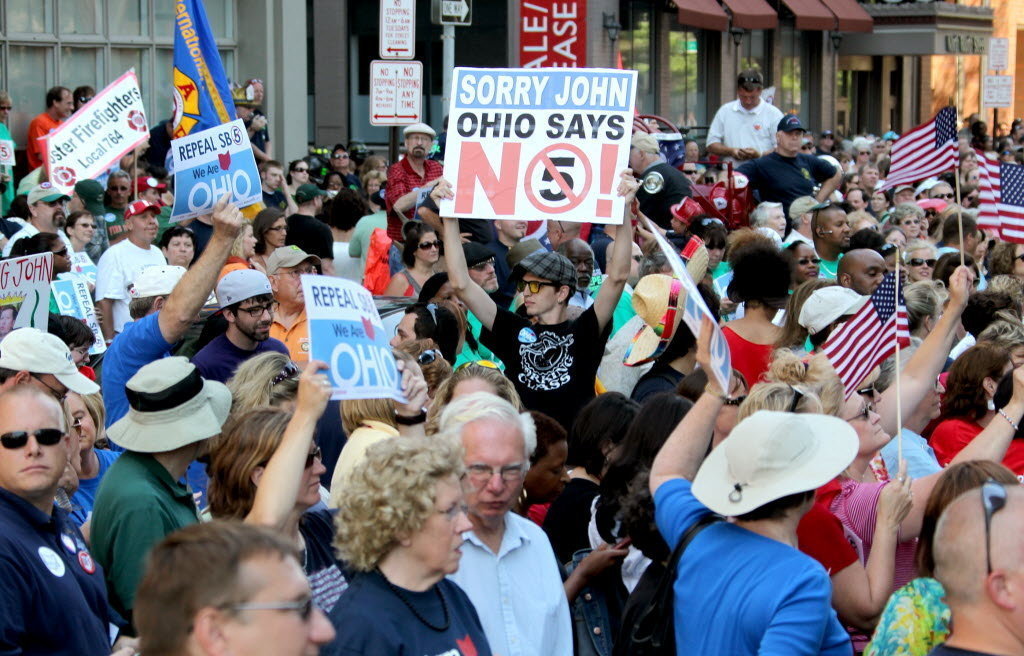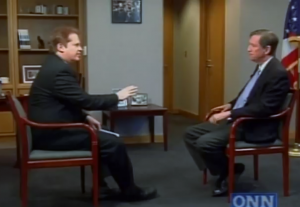John Kasich’s darkest hour as the leader of the 7th largest state happened during his first year as governor, and now he admits he was blindsided by the enormity of his mistake.
Kasich told CNN’s Anderson Cooper Monday night that the fight with organized labor was the roughest part of his nearly 8 years as governor.
“When I became governor, I tried to shove through a labor reform, and we shoved it through, without really talking to organized labor,” Kasich said. “They turned around, and put something on the ballot. They reversed my decision and handed me my lunch.”
It was called Senate Bill 5.
It created havoc in Ohio for over a year, and I wrote about it in my book Front Row Seat at the Circus.
The Republican-pushed bill, which started running parallel through the legislature with Kasich’s own proposals, limited collective bargaining rights for public employees and stopped mandatory union dues.
Two days after his election, Kasich had told a group of lobbyists, many allied with the GOP, “Please leave the cynicism and the political maneuvering at the door, because we need you on the bus, and if you’re not on the bus, we will run over you with the bus. And I’m not kidding.”
A state full of teachers, nurses, firefighters, police, highway patrol, and sympathetic union supporters immediately thought they were being run over by Kasich’s bus.
During his first State of the State address a month after taking office, over 3,000 protesters filled the Ohio statehouse, chanting “No, No, No” and “Kasich’s Got To Go!” When the governor mentioned collective bargaining in his speech, “Frankly, folks, the provisions of collective bargaining reform are examples of what we wanted to do…” a few protesters in the House gallery booed, rattling Kasich who looked up and watched as state troopers removed the protesters and then closed the House chamber doors for the first time.
Between the thousands of people chanting “recall Kasich” inside and outside the statehouse, along with those protesters interrupting his speech inside, Kasich decided never again would he hold his State of the State speech in Columbus.
In April, 2011 as polls showed public support for the collective bargaining reform bill low, I interviewed Kasich from his 30th floor office across the street from the statehouse.
As we started the interview, it didn’t take long for the topic of SB5 to turn testy. I wondered to myself, is there anyone in his inner-circle who ever dares question his decision-making? Had anyone on Kasich’s staff or in his cabinet played devil’s advocate and suggested the legislation was mistimed or just bad?
Well, I was going to. It was my job.
“Governor, should public workers in Ohio—the police, firefighters, nurses, and teachers—feel directly targeted by your administration?”
“We don’t target anybody and we’re not going after anybody,” Kasich told me. “This effort is part of a comprehensive reform effort to save our state.”
I pointed to an interview that I had the previous day with the wife of a firefighter who said, “It’s a shame my husband would put his life on the line to save Kasich in a fire, and then he turns around and does this to us.”
“How would you respond to her?” I asked.
“I respect, deeply, the efforts made by law enforcement—by our police, our firefighters, our highway patrol, and you know I’m sensitive to that. But I think that the bill that we have is very fair and balanced to the needs of the taxpayers.”
I followed up, “A Republican strategist told me yesterday ‘we can take on teachers, we can take on state government employees, but we shouldn’t have taken on police and firefighters…’”
“Wait a minute, wait a minute,” Kasich interrupted. “Somehow the language is wrong, we’re not taking anybody on.”
“But Governor,” I continued, “the politics of this, we’ve been around politics a long time…”
“I don’t…” Kasich attempted to interrupt.
“You know what is said,” I continued. “Unions have spent hundreds of millions of dollars over many election cycles trying to defeat Republican candidates. Their point now is Republicans have control and they’re going for the jugular. If Republicans can significantly weaken unions then the amount of money that comes into general election cycles against Republicans is lessened. That is a political factor?”
“Jim, Jim, Jim,” Kasich said, clearly irritated. “These people must be Machiavellian. They must be thinking about power. In my inaugural, I said I was the servant of the public and a servant of the Lord. This is not a political game for me. This is a dedication to saving my beloved state of Ohio.”
The Lord aside, I pressed on, “When firefighters say you’re taking away their binding arbitration, when unions say you take away collective bargaining, would you say Ohio was better off before the current law went into effect?”
“Well, the current collective bargaining law was put into effect along a straight party line vote, okay?” Kasich responded.
“Some would say this new law of yours will be put into effect on a straight party line vote, what would be the difference?” I asked.
“Jim, again, this is part of an overall plan, okay? I know you want to keep getting into this and I think I’ve answered all these questions,” Kasich abruptly stopped.
But I wasn’t finished. “There are 350,000 public employees, nurses, teachers, firefighters, police that are watching you on this program across Ohio. What do you say to them directly? Some have chanted, ‘recall Kasich’ at these rallies. What do you want to say to them?”
“A leader sits back and tries to figure what in the long run will serve the public,” Kasich replied. “And change is hard for anybody. Change is difficult. But I think public employees realize there needs to be balance.”
The Kasich team was unhappy with the interview, but maybe it was the only time the governor heard the reality of what many Ohioans thought about his position.
It took opponents only weeks to collect, and then submit, over a million signatures on petitions to get SB5 on the November ballot.
After a bitter and negative fight that split the state for almost a year, voters went to the polls and handed Kasich a stunning defeat. Sixty two percent rejected SB5, forcing its repeal, and handing Kasich an embarrassing loss.
A stunned governor told reporters on election night, “It’s clear the people have spoken. I heard their voices. I understand their decision. And frankly, I respect what the people have to say in an effort like this. And as a result of that, it requires me to take a deep breath and to spend some time to reflect on what happened here.”
Kasich quickly dropped collective bargaining reform from his agenda and told GOP lawmakers to stay away from a ballot initiative, backed by the tea party, to make Ohio a ‘Right to Work’ state.
Now reflecting seven years later, Kasich told Cooper:
“You know, I’m glad it happened early in my term because I learned something. I’m strong and opinionated in the things I want to do, but I’ve learned that it is better to work with others so they can have something, and we can have something. That’s the way you in which you unify. We’re losing that because we’re operating in a zero-sum game world. That means flip a coin, you win and I lose. This is very dangerous for the long term of our country.”
A leader admits mistakes, and learns from them.
Kasich certainly did that in Ohio.

